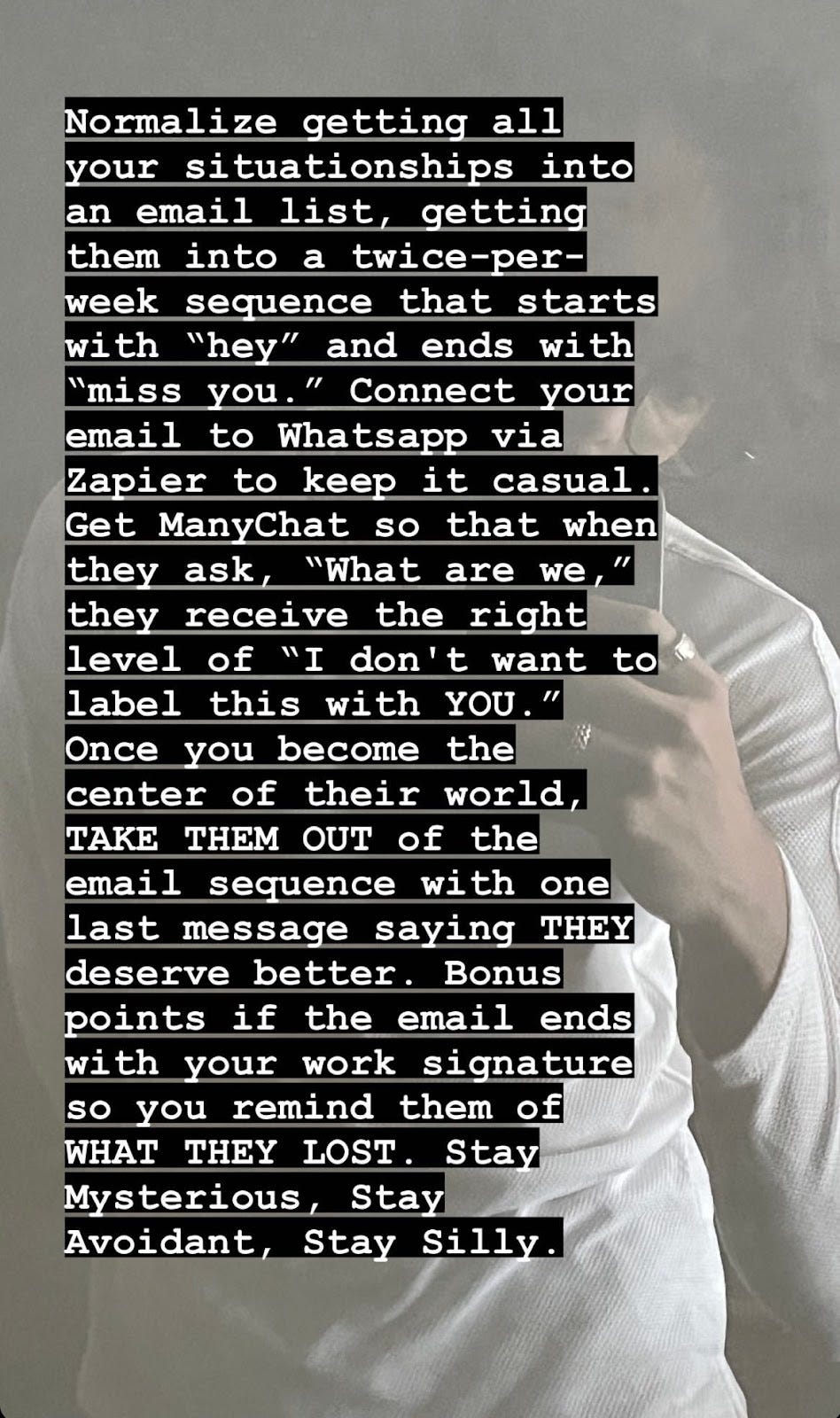Five Months In: A Man's Review of Situationships
Do Situationships Betray Love's True Essence?
Guest post by a Blasé bestie, Nicolás Forero, self-proclaimed lover and philosopher, critically acclaimed dancer, thinker, and friend.
A girl I've dated for five months sends a selfie. She looks beautiful. I want to tell her, but I'd admit she's beautiful if I did. She knows she is, and I've told her before. But I can't say it too much because I'd acknowledge a beauty I can't promise to appreciate forever.
I'm new to casual encounters.
Before 25, I believed all love affairs led to marriage. I thought of rings before thinking about sex. I enjoyed progressing towards something—a flat, a flight, a future, together.
Situationships don't have a clear end other than that they will end. They are different from the period between learning about and dating someone or another way of referring to friends with benefits. Those relationships had clear boundaries.
Situationships, I've seen, are closer to nothingness. They are another label we think gives us strength over uncertainty.
One I can use to justify behaviors I shouldn't engage in, like rationing love–the minutes I hold her hands, how much I play with her ears, and the emojis I can and can't text. A label that reminds me that everything will end. And that, because it will end, it's okay to live together for three months in Paris with this person, but it's not okay to buy fruit at the local Sunday market because that's too intimate, too close to love.
As a nerd, I turned to Plato's Symposium and its seven speeches on love for answers. Phaedrus says love is a divine force that inspires heroic acts. Eryximachus said love is a sign of a healthy body and soul. Aristophanes didn't define love but says humans once rolled through life as spherical beings with two faces, four arms, and four legs. Our rebellion against the gods led to our split, leaving us forever yearning for our other half. I find consolation in Aristophanes' myth, imagining myself as one half of a whole, seeking completion. This ideal clashes with the transient nature of situationships, where love feels temporary and constrained.
In a situationship, the internal conflict arises from engaging in a form of love where you don't meet the minimum standards of what you consciously or subconsciously feel true love should entail.
Imagine an artist painting a CEO's portrait to fund their dream project. They infuse every brushstroke with talent but can't access the full creativity they know they have, unlike when they paint purely for the love of art. Similarly, in my situationship, my affection is genuine but constrained. I'm not holding back; I simply don't feel compelled to go further.
This shallow engagement with love is apparent in how little I know about her. I learned a few quirks. I learned she liked me. I learned she doesn't want me to learn more because I could become attached, and situationships thrive on detachment.
You know much more in a committed relationship. I knew my partner's love for Nutella ice cream and her request to monitor her indulgence without making her feel judged. I learned she disliked her left profile, insisted on drinking green juice immediately, believed in universal love, and wore only fur coats from Chinese factories. I had the freedom to fulfill an unquenchable desire to perpetually know more, show more. This intimacy stands in stark contrast to the shallow engagement of my situationship.
In a situationship, sharing information requires a delicate balance—enough to show care but not enough to foster deep feelings of love. Imagine I have great news to share on a Sunday. But if Sunday is her day to read The New Yorker, starting with the 'weekend essay' and finishing with 'what we're reading this week,' she might choose to stick to her routine instead of dropping everything to celebrate with me. Anything beyond this level of sharing risks losing the autonomy that many find appealing in a situationship. This delicate balance hinders the deep connection that defines my ideal of what a relationship should be.
The trouble with me, you might say, is that I'm doing situationships wrong. I signed up for a game I theoretically disliked for 25 years to see if I truly disliked it, and now I'm whining about its rules. People who aren't sold on situationships face this criticism. They can remain unloved, untouched, unspoken to, for weeks, and they can't complain because those are the game's rules. They signed up for this. We did, back when we labeled 'situationship' a relationship that shouldn't have happened. That, for one of the two parties, may have never happened.
Why are I, and many others, becoming or accepting half-lovers? I could blame dating apps' illusion of infinite potential mates, say I'm in a work season, or argue that the women I am willing to see long-term are dating multiple men and that, to prove myself that I'm a desirable man, I should entertain many people, too. But, amidst all this acceptance of a simulation of love I don't believe in, my soul would rot because of the non-adherence to my idealized view of love.
Behavior is no accident. I accepted a situationship out of curiosity for this 'new' way of loving. Others seek a semblance of connection through a relationship that allows progress towards failure from the beginning.
Five months into my situationship, I've realized I'm not accepting a redefinition of love but diluting its essence. I hoped to understand situationships better by experiencing one. Now I realize I'm not meant to know anything. The hallmark of my past long-term relationships is that I didn't know where they were going, but I knew they were going somewhere.
There should be a time limit on how long a situationship lasts before we decide to be just friends. It shouldn't be three months.







